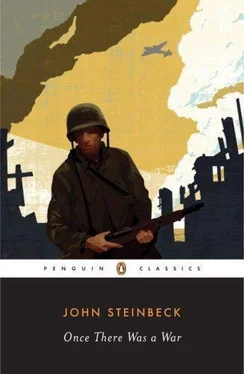John Steinbeck - Once there was a war
Здесь есть возможность читать онлайн «John Steinbeck - Once there was a war» весь текст электронной книги совершенно бесплатно (целиком полную версию без сокращений). В некоторых случаях можно слушать аудио, скачать через торрент в формате fb2 и присутствует краткое содержание. Город: New York, Год выпуска: 1960, Издательство: Bantam Books, Жанр: Классическая проза, на английском языке. Описание произведения, (предисловие) а так же отзывы посетителей доступны на портале библиотеки ЛибКат.
- Название:Once there was a war
- Автор:
- Издательство:Bantam Books
- Жанр:
- Год:1960
- Город:New York
- ISBN:нет данных
- Рейтинг книги:3 / 5. Голосов: 1
-
Избранное:Добавить в избранное
- Отзывы:
-
Ваша оценка:
- 60
- 1
- 2
- 3
- 4
- 5
Once there was a war: краткое содержание, описание и аннотация
Предлагаем к чтению аннотацию, описание, краткое содержание или предисловие (зависит от того, что написал сам автор книги «Once there was a war»). Если вы не нашли необходимую информацию о книге — напишите в комментариях, мы постараемся отыскать её.
Once there was a war — читать онлайн бесплатно полную книгу (весь текст) целиком
Ниже представлен текст книги, разбитый по страницам. Система сохранения места последней прочитанной страницы, позволяет с удобством читать онлайн бесплатно книгу «Once there was a war», без необходимости каждый раз заново искать на чём Вы остановились. Поставьте закладку, и сможете в любой момент перейти на страницу, на которой закончили чтение.
Интервал:
Закладка:
They were small, tired-looking men who might have been waiters or porters at a railroad station. Their backs were slightly bent and their knees knobby and they walked with a shuffling gait. Their huge shoes, with thick rubber soles, looked far too large for them. They were dressed in faded shorts and open shirts, and their arms were an old-fashioned revolver and a long, wicked knife for each. Their leader looked like a weary and petulant mouse who wanted more than anything else in the world to get back to a good safe job in an insurance office with the certainty that his pension would not be held up.
These five monsters came shambling aboard and went immediately below decks to get a cup of tea and a slice of that cake which tastes a little like fish. They sat mournfully in the tiny wardroom, mooning over their tea and scratching the mosquito bites on their lumpy knees.
When it was dark the MTB slipped from the dock and crept out to sea toward the island. The moon was very bright and had to be taken into account. But it was thought that in the indefinite light the action would be easier to accomplish. The motors were muffled, and the small, powerful boat pushed quietly through a smooth, moonlit sea.
On the deck the rubber boat which was to take the raiders ashore was inflated and ready. The gun crew sat quietly at their stations. Just before midnight the boat lay to, and the black outline of the island was not far ahead. Then the commandos came stumbling out of the companionway and stood about on the deck. The captain of the torpedo boat said, “You have all the plans now — cut the wires, kill the guards if possible, and bring out the admiral and his lady. How long do you think that will take you?”
The leader of the commandos gave the subject his consideration, tapping his lips with his finger. “We should be back in an hour,” he said at last.
“An hour? Why, it can’t take that long. If you take that long you won’t be able to do it at all.”
“Oh, the guards business and the wires,” the commandos explained, “that won’t take long.”
“What will, then?” the captain demanded.
“Well, the admiral’s wife will need time to pack,” the commando said. “She doesn’t know we’re coming. She won’t have her things ready.” And with that they laid the rubber boat over the side and paddled silently away.
For an hour the MTB lay in the moonlight, waiting. The sailors kept close watch on the dark island and nothing happened. There were no shots, there were no lights on the blacked-out island. The whole thing was dead and quiet in the misty moonlight.
At ten minutes of the hour the captain began to look at his watch every half-minute, and he muttered to himself about E-boat patrols and the necessity for not putting his ship in danger for nonsense. If there had been any activity ashore he would at least know there was fighting of some kind.
At five minutes of the hour a big shape showed on the water, and because everything is potentially dangerous the gunners swung their machine guns on it and waited for it to identify itself. It approached, and it was a rubber boat. It gently nudged the side of the MTB and a little, slender woman was helped over the side, and then a quite stout admiral in a beautiful overcoat, although the night was warm. These figures went immediately below, but the leader of the commandos said, “Bert, you will go back with me.” Three of the men climbed aboard the MTB, and the rubber boat shoved off again and moved back toward the island.
The three remaining commandos stood limply on the deck. The MTB captain was impatient. “Accomplish the mission?” he asked.
“Yes, sir, there were eight guards, not seven.”
“You didn’t take them?”
“No, sir.”
The captain’s eyes went quickly to the long, thin knife at the man’s belt, and the commando nervously, almost apologetically, fingered its steel hilt.
“What have they gone back for?”
“The lady’s trunk, sir. We couldn’t get it in the boat. There wasn’t room with the rest of us. They’ve gone back for her trunk. Quite a large one. Old-fashioned kind with a hump on it, you know.”
The captain put his hands on his hips and studied the little man.
“Sir?” the commando began.
“Yes, I know. And I wish it was beer, but there isn’t any.”
He called softly into the companionway, “Joel, oh, Joel, get some water on. There’ll be five teas wanted in a moment.”
CAPRI
SOMEWHERE IN THE MEDITERRANEAN WAR THEATER, October 18, 1943 —
The day after the island of Capri was taken and before any of the admirals and generals had found it necessary to inspect the defenses of its rocky cliffs and hazardous wine cellars a group of sailors from a destroyer in the harbor strolled along one of the beautiful tree-lined paths. They were inspecting defenses too, the island’s and their own, and they found their own lacking in initiative. The hill was steep and there were gardens above and below the path.
As they strolled along a shrill little voice came from under a grape arbor below the way. “I say,” said the voice.
The naval men looked over the low wall and saw a tiny old woman — a little bit of a woman — dressed in black, who came scrambling from under the grapevines and climbed up the steps like a puppy. She was breathless.
“I hope you won’t mind,” she panted. “It was very good to hear English spoken. I am English, you know.”
She paused to let this tremendous fact sink in. She was dressed in decent and aging black. She never had made the slightest concession to Italy. Her costume would have done her honor and protected her from scandal in Finchley.
Her eyes danced with pleasure, wise, small, humorous eyes. “They speak Italian here,” she said brightly, and it was obvious that she did not if she could help it. “And the Germans came,” she said, “and I haven’t heard much English. That is why I should like just to hear you talk. I like Americans,” she explained, and you could see that she was willing to take any kind of criticism for this attitude. “I haven’t heard any English. The Germans came, but I said that, didn’t I? Well, anyway, the war came and I couldn’t get out, and that is three years, isn’t it? And do you know it has been a year since I have had a cup of tea, over a year — you will hardly believe that.”
The communications officer said, “We have tea aboard. I could bring you a packet this afternoon.”
The little woman danced from one foot to the other like a child. “N-o-o-o,” she said excitedly. “Why — what fun, what fun.”
Signals said, “Is there anything else you need, because maybe I could bring that to you too?”
For a moment the old bright eyes surveyed him, measuring him. “You couldn’t—” she began, and paused. “You couldn’t bring a little pat of — butter?”
“Sure I could,” said Signals.
“N-o-o-o,” she cried, and she began to hop like a child at hopscotch. She held up a finger. “If you’ll bring me a little pat of butter I will make some scones, real scones, and we’ll have a party. Won’t that be fun? Won’t that be fun?”
She danced with excitement. “Imagine,” she said.
“I’ll bring it this afternoon,” said Signals.
“You see, I was caught here and then the Germans came. They didn’t do me really any harm. They were just here,” she said seriously. “All of my people are in Australia. I have no family in England any more.” Her old eyes became sad without any transition. “I don’t know how they are,” she said. “I have had two letters in three years. It takes nearly a year to get a letter.”
Signals said, “If you will write a letter I’ll pick it up when I bring the butter and tea and will mail it at the first port.”
Читать дальшеИнтервал:
Закладка:
Похожие книги на «Once there was a war»
Представляем Вашему вниманию похожие книги на «Once there was a war» списком для выбора. Мы отобрали схожую по названию и смыслу литературу в надежде предоставить читателям больше вариантов отыскать новые, интересные, ещё непрочитанные произведения.
Обсуждение, отзывы о книге «Once there was a war» и просто собственные мнения читателей. Оставьте ваши комментарии, напишите, что Вы думаете о произведении, его смысле или главных героях. Укажите что конкретно понравилось, а что нет, и почему Вы так считаете.









